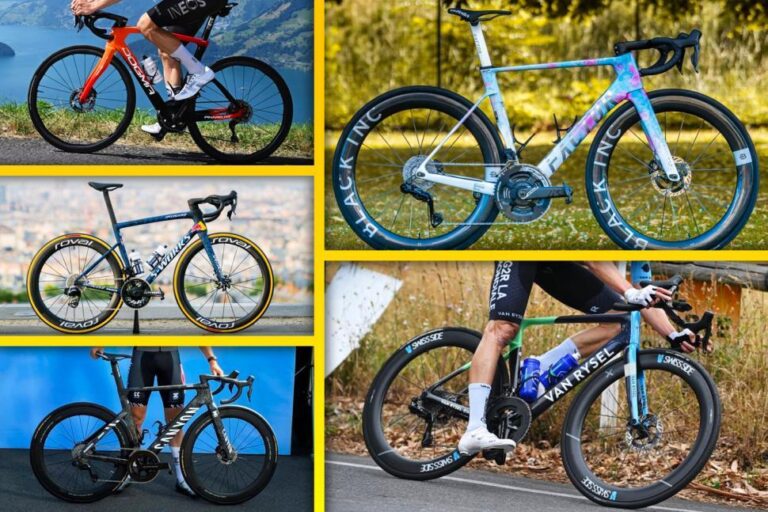2025 Tour de France: Everything You Need to Know About the Iconic Cycling Race
As the world of professional cycling gears up for the highly anticipated 2025 Tour de France, fans and athletes alike are eagerly preparing for one of sports’ most grueling and prestigious events. Slated to commence in July, this year‚Äôs race promises to showcase the pinnacle of endurance, strategy, and athleticism from teams representing various countries. In this comprehensive guide, we delve into the structure of the race, explore the critical points system that determines the leaders, examine the lucrative prize money distribution, and clarify the rules that all competitors must adhere to. Whether you’re a die-hard cycling aficionado or a casual spectator, our in-depth analysis will equip you with all the insights needed to fully appreciate the excitement of the Tour de France. Join us as we unravel the intricacies of this monumental event and celebrate the spirit of competition on two wheels.
2025 Tour de France Teams: A Closer Look at the Contenders
The 2025 Tour de France promises to be fiercely competitive, with a mix of established teams and new contenders ready to make their mark. Among the teams to watch are Jumbo-Visma, who have consistently dominated the cycling scene, and INEOS Grenadiers, known for their strategic edge and star-studded roster. Not to be overlooked, Alpecin-Deceuninck has been climbing the ranks with their youthful energy and innovative approaches, while teams like UAE Team Emirates bring a wealth of experience and depth to the competition.
Each team is equipped with a unique blend of strength and strategy, creating a complex dynamic within the race. Key factors that will influence their chances of success include:
- Team Composition: The balance between climbers and sprinters can dictate race strategy.
- Support Systems: The role of domestiques in aiding team leaders during critical stages.
- Adaptability: Teams that can adjust their tactics on the fly may gain crucial advantages.
The collaborative effort of each team member ultimately shapes the race outcomes, making the teamwork and chemistry among riders just as important as individual talent.
Understanding the Points System: Scoring and Strategy in the Race
The points system in the Tour de France is not just about crossing the finish line first; it intricately rewards strategy, teamwork, and consistency. Cyclists earn points throughout the race based on their performance in various stages, with particular emphasis on sprint sections and hill climbs. Points can be accumulated in several significant ways:
- Stage Finishes: The top finishers in each stage gain points, with more significant points awarded for overall stage victories.
- Sprint Prizes: Specific segments marked as sprint zones provide bonus points for the fastest riders.
- Mountain Points: Climbs and mountain stages feature points awarded at designated peaks, favoring climbers.
Effective strategy becomes critical, as teams must balance their resources and decide when to push their lead sprinters or climbers. Understanding when to accumulate points versus ensuring a strong overall standing can dictate a team’s overall success. The race’s format allows for different tactical approaches, and the leading teams will adjust their game plans based on current standings, with key players shifting focus to gather necessary points:
- Team Dynamics: Collaborating effectively with teammates can create opportunities to secure more points.
- Form and Fitness: Assessing physical condition as the race progresses influences point hoarding strategies.
- Stage Selection: Identifying stages favorable to a team’s strengths can maximize point earnings.
Prize Money Breakdown: How Earnings are Distributed Among Competitors
The distribution of prize money at the Tour de France is a carefully orchestrated process that rewards not only the ultimate winners but also recognizes the efforts of all participants throughout the grueling stages. The total prize pool for 2025 has been set at approximately ‚ā¨2.3 million, with funds allocated in various categories, ensuring that teams and riders are incentivized at multiple levels. Here‚Äôs how the prize money is typically broken down:
- General Classification (GC) Leaders: Top finishers in the overall standings receive a significant share, with the winner taking home around ‚ā¨500,000.
- Stage Winners: Each stage winner earns approximately ‚ā¨11,000, encouraging aggressive competition daily.
- Team Rankings: Teams that perform well collectively also benefit, with payouts based on their overall positions in the team classification.
- Bonus Points: Riders can accumulate additional financial rewards through competitive sprints and mountain climbs, adding excitement to various phases of the race.
This structured distribution encourages rivalry yet fosters teamwork, as every major achievement contributes to a team’s overall success. Here’s a simplified overview of how the prize money is allocated:
| Position | Award (‚ā¨) |
|---|---|
| 1st Place (GC) | ‚ā¨500,000 |
| 2nd Place (GC) | ‚ā¨200,000 |
| 3rd Place (GC) | ‚ā¨100,000 |
| Stage Winner | ‚ā¨11,000 |
| Best Young Rider | ‚ā¨20,000 |
Key Rules and Regulations: What Teams and Riders Need to Know
As teams prepare for the 2025 Tour de France, it’s vital to familiarize themselves with the key rules and regulations that govern the race. Each team will consist of up to eight riders, and team dynamics will be crucial in maximizing performance. Importantly, adherence to UCI regulations regarding equipment is mandatory, including bike dimensions and technology use. Riders are also expected to respect the fair play principles, ensuring that competition remains safe and sportsmanlike. Here are some essential rules to keep in mind:
- Drafting Regulations: Teams must manage drafting distances to avoid penalties.
- Feeding Zones: Designated areas where riders can receive food and drinks from team staff.
- Tampering with Equipment: Any alterations to bicycles must comply with UCI specifications.
The distribution of prize money and points is another critical aspect of the Tour. Teams are encouraged to strategize not just for stage victories but also for overall performance in the team classification. Points will be awarded based on stage finishes, while additional bonuses can be earned in the form of time trials and sprint finishes. The table below summarizes the prize distribution:
| Position | Stage Prize (‚ā¨) | Overall Classification Prize (‚ā¨) |
|---|---|---|
| 1st | 10,000 | 500,000 |
| 2nd | 5,000 | 300,000 |
| 3rd | 2,500 | 200,000 |
Future Outlook
As we look ahead to the 2025 Tour de France, excitement continues to build in the cycling community. This iconic race not only showcases the grit and determination of elite athletes but also highlights the strategic teamwork essential for success. With a comprehensive understanding of the teams, scoring system, prize money, and rules, fans can engage more deeply with the drama and strategy that unfold each stage.
As the countdown to the race begins, cycling enthusiasts can expect thrilling competition across diverse terrains, with riders pushing their limits in pursuit of the prestigious yellow jersey. Stay tuned to NBC Sports for in-depth coverage, expert analysis, and all the latest updates as we approach what promises to be another unforgettable edition of cycling’s most celebrated event.




